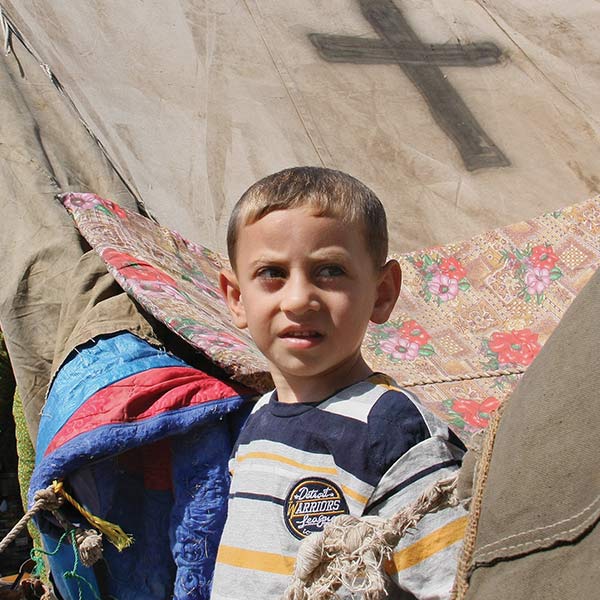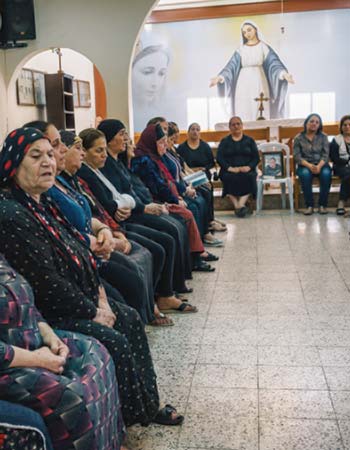Subtotal: $
Checkout-

ISIS, Stalin, and the Other “S” Word
-

Three Poems
-

The Chess Player
-

Editors’ Picks Issue 11
-

Can Society Be Christian?
-

Joe Strummer
-

Our Alien Citizenship
-

Up and Down
-

Readers Respond Issue 11
-

A Book to Build Community
-

Building a Communal Church
-

Alien Citizens
-

Becoming Flesh and Blood
-

The Body of Believers
-

Finding Utopia
-

In Search of a City
-

The Hole in Wendell Berry’s Gospel
-

American Stories
-

I Am My Enemy

The Real Radicals
Face to Face with the Persecuted Church
By Eddie Lyle
February 17, 2017
Available languages: 한국어
Devout, determined, and deadly, the young man was prepared to wage jihad. But only a few hours before he planned to take action, everything changed. He had a vision of Christ. Right then, the jihadi gave his life to Jesus.
Fearing for his life, he was forced to flee his home and is now living under a new identity in a different country. I met this remarkable brother through my work with Open Doors, an organization serving persecuted Christians worldwide. As I’ve learned in the course of my work, his story is far from unique.
More and more people from Muslim backgrounds are turning to Christ – and risking their lives to do so. For example, about forty years ago, some two hundred Christians from Muslim backgrounds were living in Iran; today that estimate is 370,000, though precise numbers are hard to come by.
So how are these conversions happening? Often, it seems, Jesus is meeting Muslims and occasionally even jihadis in dreams. One former jihadi spoke of a dream in which he was pulled from a fast-moving river by a man dressed in white. Another convert had two visions of Jesus, in which he was instructed to go to a certain location where a pastor would give him a Bible. He obeyed, and even though he’d never met the pastor before, the pastor was expecting him and even knew his name.
Some stories we hear mirror those of the Bible. Amir (not his real name), a well-respected haji, having made the pilgrimage to Mecca, could be seen as a modern-day Paul. When Amir’s daughter converted to Christianity, he was angry, and when his wife and later his son also came to Christ, he began to persecute them. He beat them and forbade them to visit the church, saying he would inform the secret police, and even threatened to kill them. But his family did not leave Christ – they left him by fleeing abroad.
In his loneliness, Amir focused on Allah, begging for revelation. But the subsequent silence made him doubt. Had his family been right? He didn’t know whether to believe in Allah or Jesus, the Bible or the Qu’ran. Finally he said, “I will believe in the God who reveals himself to me.”
Amir’s prayers were answered in a dream in which a man approached him riding a donkey. He had never seen the man before, but the man hugged him and said, “I will cleanse you of all your sins; you are free. I will give you rest. Believe in me.” When the man departed, another approached and told Amir that the man on the donkey was Jesus Christ.
The next night, Amir had the same dream. When he woke, he felt afraid. He’d served Allah for forty-five years and had made the haj. How could he leave Islam? But the following night, he had the same dream for the third time. Amir knew he had found God, but he did not know what to do next. Even though he’d forbidden his family to go to the local church, he knew he’d learn more about the man on the donkey there and decided to attend.
At first, the congregants were suspicious. Wasn’t this the man who had threatened to kill his family because they accepted Christ? But when he told them he had met Christ in a dream and wanted to give his life to Jesus, the church leaders began to trust him. Soon Amir was involved in ministry, risking his life for his faith. When his family abroad heard what had happened, they praised God for answering their prayers and happily accepted Amir back into the family. Since leaving his country and reuniting with them, Amir enjoys the novel experience of going to church without fear.
 Image from www.opendoorsusa.org
Image from www.opendoorsusa.org
Already a subscriber? Sign in
Try 3 months of unlimited access. Start your FREE TRIAL today. Cancel anytime.
Baptism Means Danger
Conversions like Amir’s do not come without cost. Many converts from Islam face discrimination and exclusion. Some suffer beatings, and others have paid the ultimate price for their faith in Christ. However, even the threat of violence doesn’t stop converts from Islam from wanting to be baptized. A baptism, usually a very public declaration of a private commitment to faith, must be conducted in secret so as not to endanger the local Christian community.
At Open Doors, we support our persecuted brothers and sisters and share the gospel where it is forbidden. Our annual World Watch List identifies the top fifty countries in which it is most difficult to be a Christian. In 2016, eight of the top ten countries cited Islamic extremism as the primary reason for persecution, and thirty-five out of the top fifty reported as much.
In this context, we’re called not only to pray for conversions from Islam but to nurture new believers. Studies have shown that in parts of the Middle East, many Muslim-background believers return to Islam if they do not receive support within six months of coming to faith. Thus, it’s imperative to reach new believers quickly to support them in the isolation and danger they experience. A sustaining Christian community is vital for people who may have lost their status, family, and livelihood because of their commitment to Christ. New believers must also have access to the Scriptures. This is why smuggling Bibles is as important to Open Doors today as it was to our founder, Brother Andrew, in the 1950s.
 Christian women gather at a church in Erbil, Iraq, to mourn the death of a member of their community (August 2016). Photograph by Alice Martins/AP Photo.
Christian women gather at a church in Erbil, Iraq, to mourn the death of a member of their community (August 2016). Photograph by Alice Martins/AP Photo.
Already a subscriber? Sign in
Try 3 months of unlimited access. Start your FREE TRIAL today. Cancel anytime.
Smuggling Hope
In 1957, Andrew van der Bijl loaded up the back of his battered Volkswagen Beetle with Bibles and Christian literature. He drove to Moscow, directly violating the laws of the Soviet Union, which forbade religious literature. He prayed as he passed through checkpoints and miraculously succeeded in meeting Christians and handing out the Bibles. When people asked him his name, he said, “I am a brother to all those who love and follow Jesus Christ.” Through these journeys, he became known as Brother Andrew.
Just as Brother Andrew did decades ago, we’re still smuggling Bibles and Christian literature into closed countries – often at great personal risk. Of course, in the digital age we have more opportunities than ever to get the Word of God to the people most hungry for it. Of the 355 million people living in the Middle East, about 50 percent now have access to the internet. Open Doors’ social media projects focus on supporting Christians in the Arabic-speaking world. This includes helping parents teach their children the values of the kingdom of God as they grow up. For example, for parents from cultures where boys are valued more than girls, it is important to share stories of a God who values everyone equally.
Tens of thousands of people from all over the Middle East, from Morocco and Libya to the Arabian Peninsula, take part in Open Doors’ online community. But the goal is to get people engaged not only online but also in a local church. To this end, an online support team operating from inside the region is available to minister to people in contact with us.
Online connections can have an offline impact. According to one local coordinator, a frequent visitor from Iraq “likes to visit our page because she feels [it] makes a difference in her life and plays an important role in her spiritual growth.… She shares the posts, stories, and subjects … to stimulate discussions with her friends. She notices a big difference in her friends’ lives in the midst of all the difficulties they are facing in Iraq right now.”
Other visitors struggle with loneliness and begin seeking God after having been touched by one of the uplifting stories posted online. A regional coordinator describes connecting with a young man from the Arabian Peninsula: “He contacted us, and now we are speaking with him about his relationship with the Lord. We are encouraging him to keep praying and reading the Bible. He said that he feels safe with us and that we’ve helped him grow spiritually and overcome his loneliness.”
Through social media, Open Doors is able to connect directly with Christians in closed countries where churches are struggling to give a public witness. Interestingly, Muslims who may be open to Christ are also seemingly at ease communicating anonymously online. One Muslim woman expressed her appreciation for our Facebook page and for the deep questions it raises. She said that many people in her country have questions about difficult religious issues. We suggested she begin reading the Bible and sent her a link to a clip that explains its message. Since then, she has begun to share her questions about the Bible, and we’ve continued our conversation with her.
As free encrypted messaging services such as WhatsApp continue to grow, so will our opportunities to minister to people’s needs. This is why, in part, Open Doors has launched a seven-year global campaign called Hope for the Middle East. The church in the West dare not stand by while extremism threatens the very existence of the church in the Middle East.
A few years ago, in an Islamic country where Christians are persecuted, Brother Andrew baptized twelve men who had converted from Islam. Because of the need for discretion, Brother Andrew used a shallow inflatable swimming pool for the occasion. Some of them insisted they wanted to go “all the way under.” As one elderly man who’d suffered a stroke six months earlier emerged from the water, he waved his right hand. The stroke had paralyzed his right side; yet in his baptism he was completely healed. Two years later, this man was martyred by extremists because he would not stop teaching the Bible and testifying about how Jesus had changed his life.
Such experiences of God’s work in closed countries lead me to believe that no threat, no law, and no terror can stifle the Holy Spirit. We must continue to pray, share, speak out, and place ourselves at personal risk on behalf of our brothers and sisters who are suffering.
One man who embodies this work is Pastor Edward, a Syrian man who still lives and works in Damascus despite the conflict in his country. For me, his commitment sums up the courage of surrendering one’s whole life to Christ. Asked why he has chosen to stay rather than flee from the violence ripping his homeland apart, Pastor Edward says, “We are representing Christ, his heart, his love for people, and his holiness. There is a spiritual battle going on, and the powers of darkness are spreading. Killing people because ‘they are not like me’ is evil. So, as ambassadors of Christ, we will spread the values of heaven. Instead of revenge, forgiveness. Instead of hatred, love. Instead of killing, giving life. It’s our responsibility to express those values even if we must pay a price.”
The photograph at the top of this article depicts Open Doors’ Arabic Bible app, showing 1 Thessalonians 2.
 Brother Andrew and his Volkswagen Beetle, which he filled with Bibles to smuggle into the Soviet Union in 1957.
Brother Andrew and his Volkswagen Beetle, which he filled with Bibles to smuggle into the Soviet Union in 1957.
Already a subscriber? Sign in
Try 3 months of unlimited access. Start your FREE TRIAL today. Cancel anytime.






























Tony Potts
Dear Rebecca, Thanks for your comment. We do not have a specific ministry but we support various organizations such as Open Doors and Voice of the Martyrs. http://www.persecution.com/ I’m sure you can find many others. With you we are praying for the persecuted church around the world. Warm greetings, Tony for Plough
Rebecca
This is a wonderful article. Thank you for publishing it. After reading, I tried to get in touch with Open Doors to inquire about their Lenten resources but, it seems, that only Open Doors UK (and not Open Doors USA) offers them (and other resources which would be helpful). The UK website is user friendly and proactive and has a number of places where one can be plugged in. But the Open Doors USA seems to be less proactive. Does Plough have their own means of helping the persecuted church?